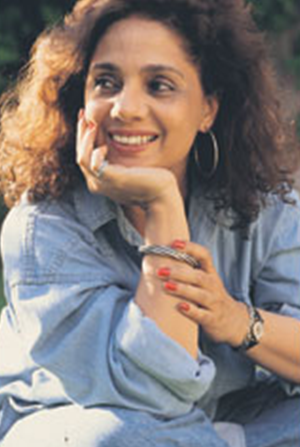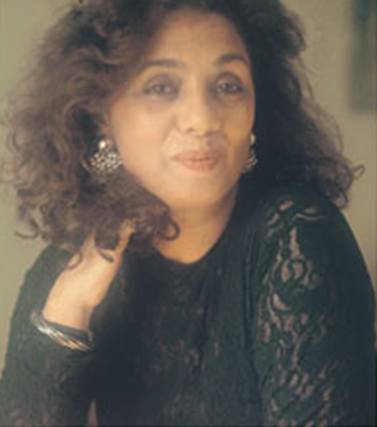Yasmeen Ismail
This is a collection of articles archived for the excellence of their content. |
Contents |
Sources include
Dawn Candle in the wind By Faisal Mamsa <> VidPk <> Dawn <> Pakistan 360 Degrees
Personal details
Born 28 March 1950, Rawalpindi –
Died 18 January 2002 (NOT 2005 as reported by some), Karachi. Buried in the Army Graveyard in Defence Housing Authority.
She studied in many schools and convents as her father, an army colonel, got posted from one place to another. She graduated from Home Economics College.
She moved to Karachi shortly after her father’s death in 1971. She got married in 1974.
Her son, Amal Ismail (born 1980), is an entrepreneur and her daughter, Sila Ismail, (born 1984) was a student of the Indus Valley School of Art and Architecture. Her husband, Tariq Ismail, is a chief executive officer of a pharmaceutical company.
Yasmeen Ismail defined suave. She was a large-eyed, graceful woman with shoulder length spiral hair and a voice that could make any man go weak in the knees.
Career
Yasmeen debuted on television in 1969 in the drama Sheeshey Ke Aadmi.
The memory of her playing the role of Shakeel’s friend in the play Ana –– back during the times of martial law, when such roles were considered controversial at best –– remains etched in people’s minds still.
She had the talent to fit into diverse characters like that of a young, level-headed woman in Tanhaiyan, in the 80’s. She played the role of "veeda," the expected future wife of the hero and the friend and business partner of the heroine of the drama shahnaz sheikh.
She was the depressed first wife in Tapish, directed by Sahira Kazmi.
She was a sex worker in Ajayeb Khana. She played a glorified bawd in the play. Despite the fact that the role, as well as the play, was extremely unconventional, her performance was very soulful.
Acting perhaps came naturally to her and she was recognised for her versatility.
In the early ninenties, she showed her comedic skills by acting in a sitcom with Khaled Anam and Badar Khalil. She was actively involved in theater and was the one to introduce TV host Ali Saleem (Begum Nawazish) to television. Yasmin also played a small role in the movie 'Deewanay Teray Pyar Ke' and gave a stellar performance in the long play 'Marhoom Brigadier Ki Betiyan' alongside Samina Ahmed.
She acted with many renowned starts like Sajid Hasan, Latif Kapadia, Shehnaz Sheikhn Marina Khan.
Despite the fact that she chose to act in unconventional characters, Yasmeen’s performance was very soulful. And while she was well established and admired for choosing extraordinary roles and coming across as a very reflective performer on television, it was theatre where her performance came across as true poetry in motion.
Theatre
Theatre lured her away as she became the head of the Karachi chapter of the Gripp’s Theatre in the 1980s.. But unfortunately, people did not value her much as an actor. She directed about 24 plays. Their plays, mostly written/adapted by playwright Imran Aslam, were appreciated by people.
Compere and actor Sajid Hasan said he had known Yasmeen Ismail since 1984. “We teamed up to do at least three productions. One play that I did with her ran for 29 days,” which was huge by the standards of Karachi or much of South Asia.
laywright Imran Aslam said: “After Yasmeen Ismail’s death I feel like an echo. We teamed up way back in 1984. She sent me a script in German. She wanted me to adapt it. I called the adaptation Choti, moti, toota and S.M. Hamid. Since then we did a play virtually every year at the PACC. Six of them were telecast on TV. In 1992 we started what we called ‘dinner theatre’ which was very topical and very heart-hitting. It was stand-up comedy. Her team members, including Riaz, Sajeer, Ameed, Riaz, Faiza Kazi, Ali Saleem, Khalid Anum and Ayesha, learnt a lot from her.”
A little before Ramazan, 2002, she directed her last play, titled Osama ho to samaney aiy, which was written by Mr Aslam.
Medical problems and last days
Dr Faisal Mamsa’s first interaction with Yasmeen took place in 1994 on the set of Tumhare Saharey. She, after taking a break from television, had restarted her career as a cheerful, carefree and independent women in the mini serial.
No one can forget her voice singing “Mujh Se Pehlei Si Mohabbat” in between the shots
She and Faisal Mamsa shared a very unique friendship; to her, Faisal Mamsa was “my doctor friend”. Back then, she used to get severe headaches and they visited various neurologists, but ultimately she gave up and decided to live with the discomfort. She would laugh it off, singing “Aur bhi dukh hain zamaney mein mohabbat ke siwa”. For some reason, she had lost trust in friendships then, and though Faisal Mamsa was not a formally trained psychiatrist at that time, he would counsel her to move on.
After she was diagnosed with cancer, there was a distinct change in Yasmeen that perhaps I could very well call heightened existential awareness. She gained a keen sense of her own finiteness. She lived her life in the immediate present instead of postponing it for future moments — moments which she knew deep down might never arrive
One evening, she called, complaining of abdominal pain. The next day, she informed Faisal Mamsa that she had a ruptured ovarian tumour and needed emergency surgery. The last four-and-a-half years of her life brought Faisal Mamsa and her together like never before; they both knew that she had little time left.
After she was diagnosed with cancer, there was a distinct change in Yasmeen that perhaps Faisal Mamsa could very well call heightened existential awareness. Mamsa had read various books on psychology, stating a theory that a certain proportion of patients tend to approach life in a different fashion, once they learn that the time is approaching for them to depart this world. Yasmeen actually became a living embodiment of this notion. She developed a new sense of appreciation for the preciousness of life and changed her priorities.
Working together, Mamsa and she introduced the concept of regret in her life. She would closely examine the regrets she had had in her past and plan her remaining life in such a way, that had she lived for another five years, she would not have looked back and said, “I wish”. I have never seen anyone taking this idea as seriously as Yasmeen. She learned to trivialise the trivia, said no to things that emotionally threatened her and devoted herself to the meaningful aspects of life: the love of family and close friends
She made the most of her creative spins and travelled from Paris to Nathiagali. But perhaps most important of all, she gained a keen sense of her own finiteness. As a consequence, she lived her life in the immediate present instead of postponing it for future moments the weekend, the summer vacations, the ‘perfect time’ moments which she knew deep down might never arrive.
Throughout all these changes, for some obscure reason, talking to Mamsa appeared to give her a sense of relief. Perhaps it was because he was a person outside her social circle that she would discuss her fears of dying with me the macabre feelings she dared not express before her friends. And he tried to treat her not as a patient but as a fellow traveller and sufferer. He promised her that he would go with her as far as it was humanly possible. When Yasmeen asked Faisal Mamsa whether he would be there when she died, he gave her his word.
As years passed by, her only wish that remained unfulfilled was that she wanted her son, Amal and daughter, Sila to settle down and get married. By this time, having no alternative but to face the grim reality, Faisal Mamsa had begun to employ denial tactics if only to make her a little more comfortable and to give her some confidence. Towards the end, heavily jaundiced because the tumour had invaded her liver, they could not seem to come to terms with the fact that her life was close to an end. She confided in Faisal Mamsa about how hurt she felt as someone dear to her had quoted that Yasmeen is history.
Faisal Mamsa met her last on the 7th of January, 2002 to tell her that I would be traveling to Multan for two days; she did not appear to be too comfortable with the idea. Two days later, at four in the morning, Mamsa received three missed calls from her phone. He tried calling back but the line would not get through. At nine that very morning, I called her again, only to find that she had passed away.
Throughout his training years, Faisal Mamsa quoted Yasmeen’s life to his patients. She is not history, but rather a person who created a history. Her passion for a laal jora and mendhi on her last Eid, the renovation of her living room while she was hospitalised and her irrepressible optimism continue to move all those who have come to learn of this enigmatic woman. She remains an inspirational figure for those who knew her and for all the cancer patients who have given up hope on life.

